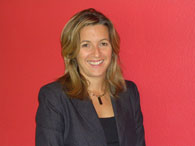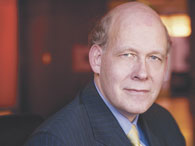Headliners: Barack, borders and beating stress
Headliners: Barack, borders and beating stress McGill University
User Tools (skip):
Headliners
Borders, Barack and beating stress
Besting stress

Lupien: Stress solutions
Work. Family. Finances. For most people, it all adds up to a mountain of stress. And when a day that never seems to end finally does, we can be tempted to just crash on the couch in the hopes that might alleviate some of the pressure. Not so, said Dr. Sonia Lupien, Director of the Centre for Studies on Human Stress at the Douglas Institute, in a recent interview with the Ottawa Citizen.
In fact, Lupien's stress-busting solution may at first seem downright strange: do more! More interests, more hobbies, more activities, that is.
"People have this tendency to think that the more you do, the more you're stressed," said Dr. Lupien. "And, you know, this is not stress. Stress is not time pressure."
Because our bodies respond to stress by pumping adrenalin to mobilize energy, we need to find outlets for that energy. Cars and cubicles don't cut it, but physical activity, or even more mental endeavors like art classes, music rehearsals, stamp collections or small businesses can help dilute that nasty stress.
Our not-so-flat world

Moore: Borders not so invisible
Globalization has given rise to a new notion of a flat world, not in the physical sense that once had explorers fearing they would sail off the edge, but based rather on the idea that the world is becoming a single economic market as barriers fall and borders lose importance.
This is an exaggeration, said Professor Karl Moore of the Desautels Faculty of Management and undergraduate student Matt Hertz in a recent op-ed in the Globe and Mail. "The real state of the world is neither globalized nor local, but semi-globalized—and it will remain so indefinitely."
They pointed to recent studies suggesting that an overwhelming majority of the world's telephone calls, web traffic, and investments occur locally, or at least within a "triad" of localities—the European Union, North America, and Asia Pacific—each of which retains barriers to entry based on language, culture, politics, and loyalty to domestic businesses.
"Clearly, in our seemingly "borderless world," borders still matter to most people," said the authors, who suggested Canadian companies must still adopt different regional strategies, concluding that "it's not a flat world, but one with hills and valleys—so get out your climbing gear."
Et c'est parti!
Le professeur d'histoire américaine Gil Troy offre son unique perspective sur les récentes victoires du démocrate Barack Obama et du républicain Mike Huckabee aux caucus de l'Iowa, dans un article qui a paru récemment dans le quotidien La Presse.
Troy, auteur de l'ouvrage Hillary Rodham Clinton : the Polarizing First Lady, note que la victoire d'Obama « indique que le racisme s'estompe de plus en plus dans l'arène politique aux Etats-Unis » et, grâce en partie à ce fameux appui d'Oprah Winfrey, « démontre aussi l'importance des vedettes en politique. », tandis que « la montée de Mike Huckabee est plutôt liée à l'affirmation de la droite religieuse aux Etats-Unis. »
Le professeur Troy insiste, cependant, que l'on doit résister toute prédiction prématurée—ce concours ne fait que débuter, et il reste plusieurs discours et peut-être quelques surprises avant que les américains se prononcent de façon définitive.
Selon lui, « Les caucus de l'Iowa ne peuvent être comparés au décollage assourdissant d'une fusée. C'est plutôt le 'pan' d'un pistolet de départ. »

